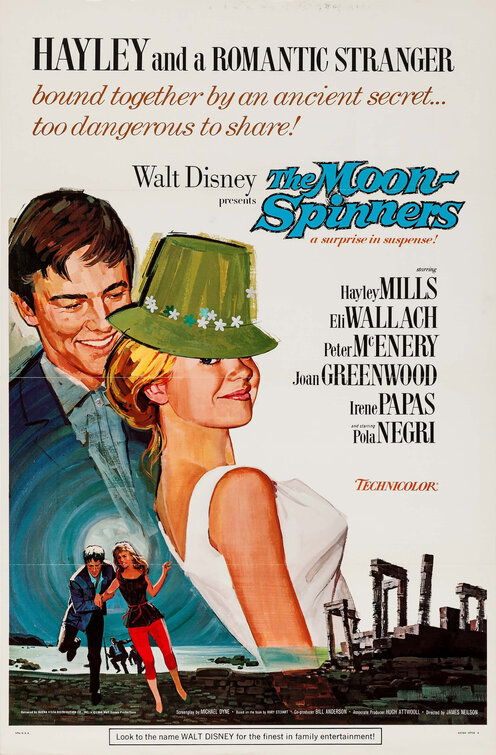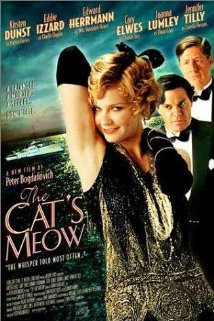“Purrfectly Speculative”

| None | Light | Moderate | Heavy | |
|---|---|---|---|---|
| Language | ||||
| Violence | ||||
| Sex | ||||
| Nudity |
What You Need To Know:
THE CAT’S MEOW is despicable in that it converts historical speculation into believable images and portrayals. A movie can be a powerful tool for convincing the uninformed public on any subject, and Hollywood’s amazing power is wielded recklessly here. That issue aside, THE CAT’S MEOW is still an interesting, funny and bittersweet interpretation of true-life incidents, with a true sense of nostalgia. Adultery, sex, drug use, drinking, and general carousing are frankly presented, however, as commonplace practices of the rich and powerful. Marriage is repeatedly mocked while mistresses or affairs are the furnished solutions to human appetites. Ultimately, THE CAT’S MEOW is a tragic, cautionary tale on many levels
Content:
(PaPaPa, ABAB, BB, ACap, RH, LLL, VV, SS, NN, AA, DD, MMM) Pagan worldview with strong themes of amoral behavior, adultery, jealousy, gossip and envy; joke made about thanking God that no morality is at party, however, in the EDITOR’S NOTE:, the movie has a cautionary message expressed clearly by one of the characters; anti-capitalist elements; revisionist history; 17 obscenities, 21 profanities, 3 exclamations of “My God,” and statement made that romantic love fades so it is better to take a lover; violence includes woman slapping man, man demonstrates being hit in stomach by cannonball, and man commits murder (man shot in head with pistol), with some blood shown; strong themes of adulterous behavior and general portrayal of mistresses as commonplace in Hollywood and among the rich and powerful, couple kisses in bed, a few instances of implied sex, brief glimpse of one man and two women in bed together (though covered), jokes made about man impregnating a 16-year-old girl; character confesses to his “affair with a child”; women in nightgowns, bras and low-cut dresses, brief upper female nudity (woman flashes at party guests); alcohol use and abuse; smoking and drug use; and, implied blackmail, lying, deception, marriage repeatedly mocked or derided, married guests at party portrayed as prudes, and derogatory comments made about man (calling him a cripple) and another called a “Jap.”
More Detail:
THE CAT’S MEOW is truly despicable in that it converts historical speculation into believable images and portrayals. A movie can be a powerful tool for convincing the uninformed public on any subject and Hollywood’s amazing power is wielded recklessly here. The inclusion of the comment about “whispers” merely provides free license to smear the dead.
That issue aside, THE CAT’S MEOW is still an interesting interpretation of true-life incidents which led to the mysterious death of Tinseltown producer and world class director Thomas Ince. The story is funny and bittersweet, with a true sense of nostalgia. Portrayals of Hearst (Edward Herrmann), his lover actress Marion Davies (Kirsten Dunst), Ince (Cary Elwes), and Charlie Chaplin (Eddie Izzard) are marvelously recreated here. Some liberties were undoubtedly taken, but much of the events of their lives are accurately presented in THE CAT’S MEOW. The music, thoroughly enjoyable and critical to the era, acts as an anesthetic for the pain and suffering of those “good old days.” Even Dunst admirably warbles through the sultry closing song.
The 1924 excursion included some of the powerful of early Hollywood, and much time is spent exploring and justifying their self-centered behavior. Adultery, sex, drug use, drinking, and general carousing are presented as commonplace practices of the rich and powerful. So, too, is the art of treating other human beings in a cruel fashion. The tongue can be just as dangerous today. In THE CAT’S MEOW, marriage is repeatedly mocked while mistresses or affairs are the furnished solutions to human appetites. Most of the players are a fairly self-absorbed bunch with their own hidden agendas, so it appears that fallen human nature is timeless.
Herrmann’s portrayal of Hearst is a frightening glimpse at a powerful, flawed man. Hearst as host is congenial but dangerously volatile. It is oddly ironic to watch Hearst impose his own version of morality on the ship’s guests (a practice verified by biographers and surviving family members). He limits their alcohol consumption, a nod to uprightness but likely just a power play, yet brazenly frolics with his own mistress. You believe he exercises his strong will simply because he can. He is the temperamental emperor wearing the unseen clothes of presumed power. He may, as the movie suggests, actually have been suspicious of his mistress’ romantic interest in Charlie Chaplin, and he may have set out to stop him or harm him, though biographers believe he would never resort to violence. Alas, Thomas Ince is mistaken for Chaplin and the conjecture spins wildly out of control.
Dunst as Davies, on the other hand, is delightfully delicious. Her character is charming, sweet and seriously misguided. Davies’ true-life affair with Hearst, though 34 years between them, is considered legendary in Hollywood. She struggled with the gold digger taunts, and he, apparently, would do anything to keep her. Davies’ love for him may have been closer to respect or a desire for a father figure in her life. In any event, their relationship comes off as strangely incestuous and terribly sad. Adding to the believability of this fictional account, THE CAT’S MEOW wisely shows the pain and emptiness of these romanticized affairs.
In addition to the painful introspection of the rich and powerful of the past, THE CAT’S MEOW offers several honed insights on the culture of today and yesteryear. These perceptive “morality tale” type observations almost make the movie worth watching. One example of note occurs as the partygoers wildly dance the Charleston. The narrator, as one of the guests herself, muses, “We fail to notice how ridiculous we all look,” so we choose to keep on dancing. She goes on to say, “For if we stopped” the partying and frivolity, we would have nothing. This is a keenly accurate discernment of life in the fast lane. A life without meaning and eternal purpose is ultimately left to its own desires and gratifications.
THE CAT’S MEOW is a tragic story on many levels. Historians consider the events on this yacht to be one of Hollywood’s earliest scandals. However, even without foul play, there are many other tragic tales and wasted lives glimpsed in THE CAT’S MEOW.


 - Content:
- Content: 




